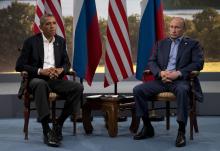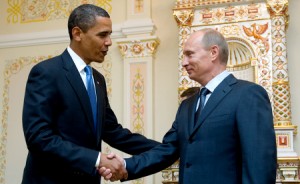
The White House earlier this month canceled a planned meeting between President Obama and Russian President Vladimir Putin on the sidelines of next week’s G20 summit it St. Petersburg. (AP Photo)
(CNSNews.com) – Russian warships reportedly were heading for the eastern Mediterranean on Friday, one week before President Obama is due to attend a G20 summit hosted by President Vladimir Putin at a time when bilateral relations are at their lowest ebb since Russia invaded Georgia five summers ago.
As Obama continues to mull a possible military strike against Moscow’s ally in Damascus, a Russian military official told Interfax a Black Sea Fleet guided missile cruiser and anti-submarine ship from the Northern Fleet were being deployed in response to “the well-known situation now in the eastern Mediterranean.”
Already in those waters are four U.S. Navy Arleigh Burke-class guided missile destroyers, with a fifth on its way. Each is armed with dozens of Tomahawk missiles, whose 1,000-mile range would bring any target in Syria within reach without risking any retaliatory strikes. Syria’s Russian-supplied Yakhont anti-ship missile systems have a range of about 250 miles.
Interfax indicated that the Moskva may be one of the Russian ships headed for the area. The guided missile cruiser is the flagship of the Sevastopol-based Black Sea Fleet, and was deployed during the brief Russia-Georgia war in August 2008, during which Russia blockaded the former Soviet state’s ports.
The Russian news agency did not identify the second ship, but the Murmansk-based Northern Fleet boasts several anti-missile vessels, including the Vice-Admiral Kulakov, which conducted naval drills close to the Syrian coast in July 2012.
Shortly after the Interfax report appeared, a navy spokesman told the state-owned RIA Novosti agency that naval movements in the area were part of “a planned rotation.”
After the Soviet Union’s collapse Russia down its 5th Mediterranean Squadron, but it maintains a Soviet-era support facility at the Syrian port of Tartus. Last March the Defense Ministry announced plans to establish a permanent rapid-reaction force to defend Russia’s interests in the Mediterranean.
Russia has stymied Western efforts to respond to the Syrian civil war through the U.N. Security Council, and since last week’s chemical weapon attack near Damascus has repeatedly warned the U.S. and its allies not to take military action against President Bashar Assad’s regime. Russia disputes the Western charges that the regime carried out the chemical attack, instead backing Assad’s claim that opposition rebels were responsible.
The Moscow Times on Thursday quoted Russian military expert Alexander Khramchikhin as saying the decision to increase its naval presence in the area was “psychological” and that Russia was not expected to go further. An actual military confrontation between Russian and Western forces was “exceedingly unlikely.”
“We do not intend to fight with anyone,” Russian Foreign Minister Sergei Lavrov told a press conference early this week.

The White House earlier this month already canceled a planned Obama-Putin one-on-one on the G20 sidelines, citing a lack of progress in the areas of missile defense and arms control, and Russia’s decision to grant temporary asylum to former intelligence analyst Edward Snowden.
For many months the Obama administration has maintained that the U.S. and Russia have “common interests” in seeing a resolution to the Syria conflict, including regional stability. Yet Moscow’s approach to the crisis has repeatedly called into question the notion that it shares Washington’s Middle East objectives.
By siding with Assad – and with Assad’s “axis of resistance” allies Iran and Hezbollah – Putin has placed Russia at odds not just with the U.S. but also with Turkey and virtually every Arab government.
Russia insists that any action on Syria should be authorized by the U.N. Security Council, but it has used its veto there to kill three Western-introduced resolutions since the civil war began in 2011.
Russia incidentally did not seek a Security Council green light before invading aspiring NATO member Georgia in 2008, after the Georgian government tried to rein in two pro-Moscow separatist regions.
That crisis drove Russia’s relations with the West, already strained over NATO enlargement and U.S. missile defense plans for central Europe, to their lowest point since the end of the Cold War.
But Obama in 2009 pledged to “reset” relations with Moscow, and at his first meeting with then-President Dmitry Medvedev, the two in a joint statement reaffirmed that “the era when our countries viewed each other as enemies is long over.”
But despite some progress in nuclear reduction under the 2010 New START treaty, Washington’s approval the following year of Russia’s accession to the World Trade Organization, Obama’s adjustments to the European missile defense proposals, and the granting of permanent normal trade relations last year, ties have cooled significantly, especially since Putin’s return to the Kremlin 15 months ago.
Republican presidential hopeful Mitt Romney was derided by political opponents last year for describing Russia as America’s “number one geopolitical foe,” but subsequent developments lent some support for his assertion.
Tensions arose over U.S. legislation targeting Russian human rights violators, Moscow’s refusal to support a strengthening of earlier U.N. sanctions against Iran, U.S. criticism of repressive domestic policies in Russia, the Snowden affair, and deepening disagreements over Syria – especially since last week’s deadly chemical attack.
Source material can be found at this site.









